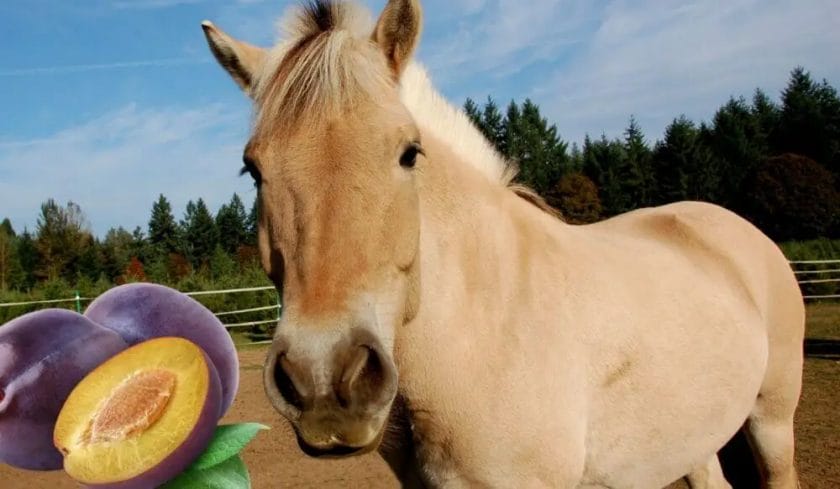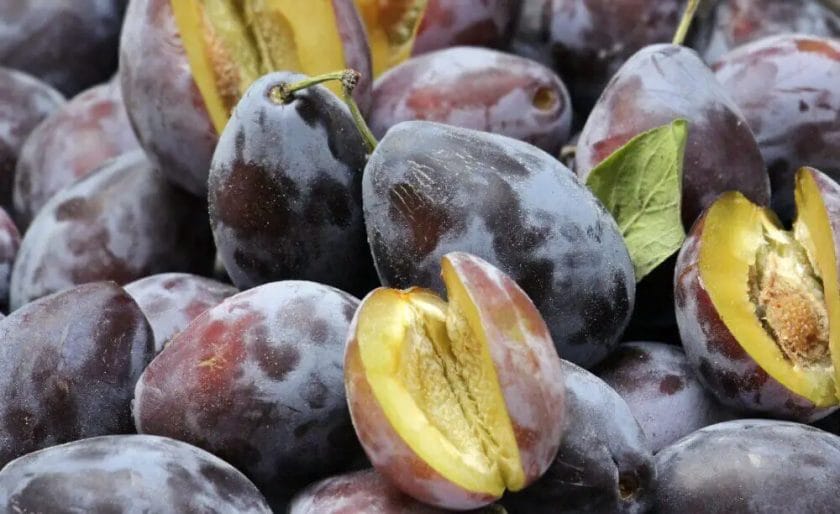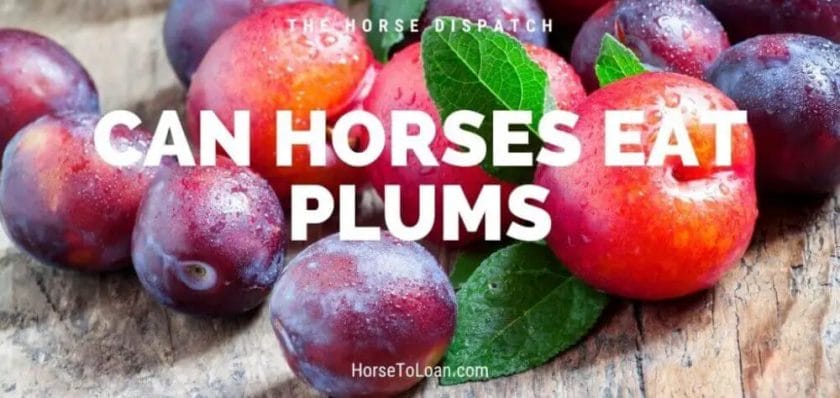Wondering if horses can eat plums? While horses are herbivores with a diverse diet, it’s important to provide them with safe and suitable foods. Plums can be enjoyed by horses in moderation due to their nutritional content and natural sugars. However, it’s important to remove the pit as it can pose a choking hazard. As always, it’s advisable to consult with a veterinarian before introducing any new foods to your horse’s diet.

Precautions when feeding plums to horses
While horses can safely consume a variety of fruits, including plums, it is important to take certain precautions to ensure their health and well-being. Plums are a delicious and nutritious treat for horses, but they should be given in moderation and with some considerations in mind.
1. Quantity and Frequency
When feeding plums to horses, it is crucial to control the quantity and frequency of consumption. Horses have sensitive digestive systems, and overindulging in plums can lead to digestive upset, including diarrhea or colic. It is recommended to limit plum intake to small quantities as an occasional treat rather than a regular part of their diet. A general rule of thumb is to offer no more than 1-2 plums per horse per day.
2. Pits and Seeds
It is essential to remove the pits and seeds from plums before feeding them to horses. Plum pits contain amygdalin, a compound that can release cyanide when ingested. Cyanide is toxic to horses and can cause severe health issues, including respiratory distress and even death. Always ensure that the plums are pitted thoroughly and that no seeds remain.
3. Freshness and Quality
When feeding plums to horses, it is crucial to offer fresh and high-quality fruits. Rotten or moldy plums can cause gastrointestinal problems and should never be given to horses. Additionally, make sure the plums are free from any chemical treatments or pesticides that could be harmful to horses. Organic or locally sourced plums are often the safest option.
4. Introduction and Observation
If you are introducing plums to your horse’s diet for the first time, it is advisable to do so gradually. Start with a small piece or a single plum and monitor your horse’s reaction. Some horses may have individual sensitivities or allergies, and it is essential to watch for any signs of adverse reactions such as diarrhea, colic, or behavioral changes. If any abnormalities occur, discontinue feeding plums immediately and consult a veterinarian.
5. Balanced Diet
While plums can provide vitamins and minerals, they should never replace a balanced and appropriate diet for horses. Horses require a diet primarily consisting of forage, such as hay or pasture, along with concentrated feeds designed specifically for their nutritional needs. Plums should be viewed as an occasional treat and not a substitute for a well-rounded equine diet.
6. Allergies and Medical Conditions
Some horses may have allergies or underlying medical conditions that make them more susceptible to adverse reactions from certain foods. Before introducing plums, or any new food, into your horse’s diet, it is important to consult with your veterinarian. They can provide guidance based on your horse’s individual needs and help determine if plums are a safe and suitable addition to their diet.
In summary, plums can be a tasty and healthy treat for horses when given in moderation and with proper precautions. Controlling the quantity and frequency, removing pits and seeds, offering fresh and high-quality plums, introducing them gradually, maintaining a balanced diet, and considering individual allergies or medical conditions are all crucial when feeding plums to horses. By following these precautions, you can safely incorporate plums into your horse’s diet and provide them with a special and nutritious treat.

Alternative Fruits for Horses Besides Plums
In this section, we will explore some alternative fruits that can be fed to horses, in place of plums. While plums are generally safe for horses to consume in moderation, it’s always a good idea to introduce variety into their diet and explore other options. Here are a few fruits that can be a healthy addition to a horse’s diet:
1. Apples
Apples are a popular choice for horse owners when it comes to treating their equine companions. They are rich in vitamins A and C, as well as dietary fiber. However, it’s important to remove the seeds and core before feeding apples to horses, as they can be a choking hazard.
2. Carrots
Carrots are not only a low-calorie treat for horses but also a great source of beta-carotene, which converts to vitamin A in their bodies. They can be given as whole carrots or chopped into smaller pieces for easy consumption.
3. Watermelon
Watermelon is a hydrating fruit that can be a refreshing treat for horses, especially during hot summer months. It is high in water content and provides essential vitamins and minerals. Remove the rind and seeds before offering it to your horse, as they can be difficult to digest.
4. Bananas
While bananas may not be a typical fruit fed to horses, they can be a nutritious option in moderation. Bananas are a good source of potassium and provide some natural sugars. However, it’s important to feed them in small quantities due to their higher sugar content.
5. Oranges
Oranges are a citrus fruit that can be a tangy and refreshing treat for horses. They are loaded with vitamin C and other essential nutrients. It’s best to remove the peel and separate the orange into segments before feeding it to your horse.
6. Strawberries
Strawberries are a sweet and juicy fruit that can be enjoyed by horses as an occasional treat. They are rich in antioxidants and vitamin C. Ensure that you remove the green tops and cut the strawberries into smaller pieces before offering them to your horse.
7. Pears
Pears are another fruit that can be fed to horses as a treat. They are a good source of fiber and vitamins, such as vitamin C. Make sure to core and slice the pears before offering them to your horse.
8. Blueberries
Blueberries are small but packed with vitamins and antioxidants. They can be a healthy addition to a horse’s diet when given in moderation. Blueberries can be offered whole or mashed as a special treat.
Remember, when introducing new fruits into your horse’s diet, it’s important to start with small amounts and monitor their response. Some horses may have sensitivities or allergies to certain fruits. Always consult with your veterinarian for specific dietary recommendations for your horse.

How to Introduce Plums into a Horse’s Diet
If you are looking to add some variety to your horse’s diet, plums can be a nutritious and tasty addition. However, it is important to introduce new foods gradually and ensure they are safe for equine consumption. In this section, we will guide you on how to introduce plums into your horse’s diet in a safe and healthy manner.
1. Choose Ripe and Fresh Plums
When choosing plums for your horse, opt for ripe and fresh ones. Look for plums that are firm but slightly soft to the touch. Avoid plums that are overly ripe or have any signs of mold or rot.
2. Wash the Plums
Prior to feeding plums to your horse, make sure to wash them thoroughly to remove any dirt, pesticides, or residue. This will help prevent any potential harm to your horse’s health.
3. Start with Small Quantities
It is important to introduce new foods gradually into your horse’s diet to avoid digestive upset. Begin by offering your horse a small quantity of plums, such as one or two slices, and observe their reaction. Monitor for any signs of allergic reactions or digestive issues.
4. Monitor Your Horse’s Reaction
After your horse has consumed a small amount of plums, observe their behavior and overall health for the next 24 hours. Look for any signs of discomfort, such as colic, diarrhea, or changes in appetite. If any negative reactions occur, discontinue feeding plums immediately.
5. Increase the Quantity Gradually
If your horse shows no adverse reactions to the initial introduction of plums, you can slowly increase the quantity over time. Monitor their digestion and overall well-being during this process.
6. Remove the Pit
Before offering plums to your horse, it is crucial to remove the pit. The pit can pose a choking hazard and should never be fed to a horse. Cut the plum into small, bite-sized pieces, ensuring there are no pits present.
7. Offer as an Occasional Treat
While plums can be a healthy addition to a horse’s diet, they should only be offered as an occasional treat. Moderation is key to maintaining a balanced diet for your horse. Too many plums can disrupt their digestive system and lead to health issues.
8. Consult with a Veterinarian or Equine Nutritionist
If you have any concerns or questions about introducing plums or any other new food into your horse’s diet, it is always best to consult with a veterinarian or equine nutritionist. They can provide personalized guidance based on your horse’s specific needs and dietary requirements.
In summary, introducing plums into a horse’s diet can be a nutritious and enjoyable experience. Remember to choose ripe and fresh plums, wash them thoroughly, start with small quantities, monitor your horse’s reaction, remove the pit, offer as an occasional treat, and seek professional advice if needed. By following these guidelines, you can safely introduce plums and add variety to your horse’s diet.
Potential Risks of Feeding Plums to Horses
While plums may seem like a healthy and tasty treat for humans, it is important to be aware of the potential risks associated with feeding plums to horses. Although some horses may enjoy eating plums, it is crucial to consider their nutritional needs and potential adverse effects. Here are some potential risks of feeding plums to horses:
1. Digestive Upset
Horses have a delicate digestive system that is designed to process a specific diet of grass and hay. Feeding plums, which are high in sugar and fiber, can disrupt their digestive balance. Excessive consumption of plums can lead to digestive upset, including diarrhea, colic, and other gastrointestinal issues.
2. Choking Hazard
Plums have a pit or stone in the center, which can pose a choking hazard for horses. If a horse swallows the pit without chewing it thoroughly, it may get lodged in their throat or digestive tract. This can be a life-threatening situation and may require immediate veterinary intervention.
3. High Sugar Content
Plums are naturally sweet and have a high sugar content. Horses have a limited ability to process and metabolize sugar, and consuming excessive amounts can lead to various health issues, including insulin resistance, laminitis, and obesity. Regular feeding of plums can disrupt the horse’s blood sugar levels and overall metabolic health.
4. Pesticide Exposure
Unless the plums are specifically grown organically, they may have been treated with pesticides or other chemicals. Horses are more sensitive to pesticide exposure compared to humans, and ingestion of contaminated plums can lead to toxicity and adverse health effects.
5. Nutritional Imbalance
Feeding plums as a regular part of a horse’s diet can create a nutritional imbalance. Horses require a specific balance of carbohydrates, proteins, fats, vitamins, and minerals for optimal health. Plums are not nutritionally balanced for horses and can lead to deficiencies or excesses in certain nutrients, which can have a negative impact on the horse’s overall well-being.
In summary, while horses may be curious about plums and may even enjoy the taste, it is important to consider the potential risks involved. Feeding plums to horses can lead to digestive upset, choking hazards, high sugar intake, pesticide exposure, and nutritional imbalances. It is always best to consult with a veterinarian or equine nutritionist before introducing any new fruits or treats into a horse’s diet to ensure their health and well-being.
FAQs
Can horses eat plums?
No, it is not recommended to feed plums to horses. Plums can be harmful to horses as they contain pits that can cause choking or blockage in their digestive system. It is best to stick to feeding horses their normal diet of hay, grass, and horse-specific feeds.
Conclusion
In conclusion, horses should not consume plums as part of their diet. While plums are generally safe for human consumption, they can be harmful to horses due to their high sugar content and potential to cause digestive issues. Horses have sensitive digestive systems that are not designed to process large amounts of sugar, which can lead to colic or laminitis. It is always best to stick to a horse’s natural diet of grass, hay, and specially formulated horse feed to ensure their overall health and well-being. If you suspect your horse has ingested plums or any other potentially harmful food, it is recommended to consult with a veterinarian for proper guidance and treatment.
